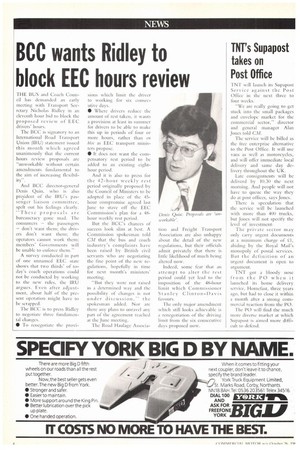BCC wants Ridley to block EEC hours review
Page 6

If you've noticed an error in this article please click here to report it so we can fix it.
THE BUS and Coach Council has demanded an early meeting with Transport Secretary Nicholas Ridley in an eleventh hour bid to block the proposed review of EEC drivers' hours.
The BCC is signatory to an International Road Transport Union (IRU) statement issued this month which agreed unanimously that the current hours review proposals are "unworkable without certain amendments fundamental to the aim of increasing flexibility".
And BCC director-general Denis Quin, who is also president of the IRU's passenger liaison committee, spelt out his feelings clearly. "These proposals are bureaucracy gone mad. The consumers — the passengers — don't want them; the drivers don't want them; the operators cannot work them; members' Governments will be unable to enforce them."
A survey conducted in part of one unnamed EEC state shows that two thirds' of today's coach operations could not be conducted by working to the new rules, the IRU argues. Even after adjustment, about half of the present operation might have to be scrapped.
The BCC is to press Ridley to negotiate three fundamental changes.
• To renegotiate the provi sions which limit the driver to working for six consecutive days.
• Where drivers reduce the amount of rest taken, it wants a provision at least in summer for drivers to be able to make this up in periods of four or more hours, rather than el, bloc as EEC transport ministers propose.
• It does not want the compensatory rest period to be added to an existing eighthour period.
And it is also to press fir the 42-hour weekly rest period originally proposed by the Council of Ministers to be adopted in place of the 45hour compromise agreed last June to stave off the EEC Commission's plan for a 48hour weekly rest period.
But the BCC's chances of success look slim at best. A Commission spokesman told CM that the bus and coach industry's complaints have been raised by British civil servants who are negotiating the tine point of the new regulations, hopefully in time for next month's ministers' meeting.
"But they were not raised in a determined way and die possibility of changes is not under discussion,'' the spokesman added. Nor are there any plans to unravel any part of the agreement reached at the June meeting.
The Road Haulage Associa tion and Freight Transport Association are also unhappy about the detail of the new regulations, but their officials admit privately that there is little likelihood of much being altered now.
Indeed, sonic fear that an attempt to alter the rest period could yet lead to the imposition of the 48-hour Ii nit which Commissioner Stanley Clinton-Davis favours.
The only major amendment which still looks achievable is a renegotiation of the driving limit from the six consecutive days proposed now.








































































































